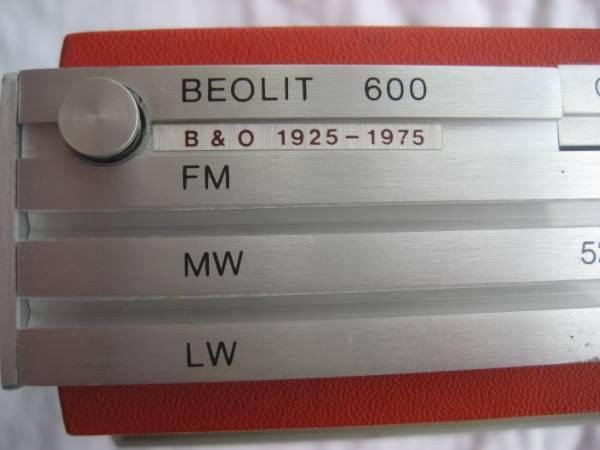Forum Replies Created
-
AuthorPosts
-
Dillen
ModeratorBeolink 7000 does not operate Beomaster 6000.
You will need the Terminal 6000.https://www.beoworld.org/prod_details.asp?pid=994
Martin
Dillen
ModeratorIt’s all mechanical.
It’s basically the rod on which the small black knob sits inside the speed selector knob.
Often found stuck in dried and hardened lubricants.
Depending on the motor type it lifts and lowers the idler wheel or the motor spindle or
controls pressure on felt brakes in a govenor-type setup.
Take apart, clean and lubricate.Martin
Dillen
ModeratorSeized fine speed regulator would also be my guess.
Very common if not serviced.Martin
Dillen
ModeratorFailing cantilever suspension perhaps.
While playing a record, try (carefully) to add a little finger-weight onto the cartridge – just enough to see the stylus change its tracking angle.
If it snaps down and starts playing clean and right, the suspension is failing (can be repaired by experts).Martin
Dillen
ModeratorHow much to fast?
Has it been serviced or has the speed selector seized at a high setting?Martin
Dillen
ModeratorHole?
Three dollars?
Honestly…It’s a general misunderstanding that a B&O service manual will tell you how to repair something.
It won’t and it doesn’t.
It tells you how the thing was built, it gives part numbers for ordering, adjustment procedures and a few hints here and there.
The rest is up to your technical education, and in this case also experience as this deck is not a good project for a beginner.Please understand that it’s neither the Beograms nor our fault, if you cannot repair your Beogram yourself.
Most of us here will do our best to help members in need with advice, guidance, ideas and perhaps even parts, – doing our
best – but we cannot take a guess at which part(s) you need to replace in this case, and we have no idea about the level of your skills.
Most likely, as I also told you in the PM, all of these decks will need a thorough restoration by now. There will almost certainly be several defective parts, broken connections and whatnots, often making it impossible to diagnose one single issue at a time.
When you have replaced the IC you may, or may not, have cured one issue. And with this cured, the next issue will become apparent. Working this way, it could take you two years.Besides, many Beoworlders are located in northern hemisphere areas, – it’s summer here, people are out and about, and the forum is very quiet.
And one more thing – and don’t take this the wrong way, – I would like to help everybody the best I can, but
the “if you won’t help me, I will throw it away”-attitude tells a lot about the lack of importance this job and the lack of value this Beogram has to you.
Surely, it won’t see me upping my efforts.
My time will be better spent on something that will give meaning and value to someone.As said before, Beogram 8000 is a great performing deck worth having repaired, or even restored, professionally.
Seeing as you are based in AZ/US, I would consider contacting one of the guys from Beolover.
What they charge I don’t know, but most of these jobs usually end up in the EUR 300-500 range here,
and a well serviced Beogram, if also nice visually, can sell for up to twice that amount.If you don’t want to continue repairs, someone else surely will.
Martin
Dillen
ModeratorYou have already achieved more than most owners could/would.
These Beograms are wonderful decks, but not easy to service as they are so different from everything else, and it’s often seen that several problems and faults are present at the same
time, which can easily confuse matters immensely and make diagnosing difficult.
I suggest you leave servicing to someone with more experience. The results will be great and the Beogram is worth it.Whenever I have problems with my car, I try to fix as much as possible myself, – and I can
do quite a lot myself, really – but every now and then a repair is necessary for which I simply don’t have the knowledge, experience and/or tools and instruments, and in these
cases I bring it in for servicing at a pro car repairshop.
I don’t throw my car away just because a problem comes up that I cannot solve myself.Of course your Beogram can be repaired.
If you are in – or near – Denmark, I’d happily take a look at it.Martin
21 July 2023 at 18:11 in reply to: Beocord 8002: Did I get the capacitor orientation correct here? #47719Dillen
ModeratorThe “solid” marking indicates ground.
That’s not necessarily the capacitors negative pin because some capacitors work with negative voltages.
The best reference is what the factory fitted (though that is not always guaranteed to be correct either).Martin
Dillen
ModeratorThe return to stop indicates a CPU reset.
Replace capacitors, replace CPU socket, check solder joints.Martin
Dillen
ModeratorWhat happens if you unplug the Beogram from the amp completely?
Martin
Dillen
ModeratorThis is not the only Bang & Olufsen product currently available on the market.
There are many others to choose from. And at many price levels, – for beach or home use.You don’t have to buy any of it, if you don’t want to.
These Beogram based products may bring a respectable revenue – I cannot say – but I see them merely as novelty products, really.
Colors can be discussed. A matter of taste, I suppose.
Nice none-the-less.
Unique and special.You could take a look at how Bang & Olufsen chose to mark their 50 years anniversary in 1975 product-wise;
Well, to put it short they … (insert drum-roll)… put a sticker on a number of portable radios and distributed them
to the employees who participated in the celbration party at the factory.Not exactly an earth-quake of a product – but collectable still, – almost 50 years later.
Martin
Dillen
ModeratorThat is not a flagship. It is just a modded turntable with a Core and the 28’s in a – admitted – beatifully crafted cabinet. Something for very few people with loads of money to spend on nostalgia (for some probably even just as an investment). Why so much efford on keeping an an inferior reproduction medium alive – I don’t get it? This is how a flagship looks – something that has future potential and something that a lot of people can have in their homes:
Sorry, Steve – but thanks for the video anyway. MM
How much future potential does a flatscreen TV have – flagship or otherwise?
10 years? 25? 50?Martin
Dillen
ModeratorYes
Has little glue remains, but they should file off easily.Martin
Dillen
ModeratorWeak power supply?
Check power supply voltages.Martin
Dillen
ModeratorSo…
Sound drops out after a few seconds, and VU-meters follow?
The tape keeps running?
Both tape reels are rotating?
And if you touch the tapehead solder tags you get a buzz from the speakers and deflection on the VU-meter?Sure the tape has a good recording on it?
Martin
Dillen
ModeratorCheck for cracked solder joints, particularly where connectors are soldered in the main PCB.
Martin
Dillen
ModeratorDo you have a photo?
Martin
Dillen
ModeratorDid you check the 7Vref?
It’s not important if Dolby is in or out. The signal runs through parts of the Dolby ICs regardless.Martin
Dillen
ModeratorSounds like a mechanical problem, – misaligned tapeheads or something bent in the tape path.
Is the tape running off the head?Martin
Dillen
ModeratorAnd there are in fact two different counterweights – used in different models, but very similarly looking and not interchangeable.
Martin
-
AuthorPosts


